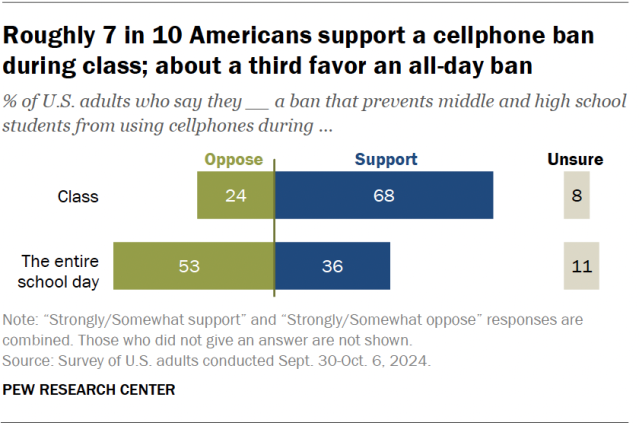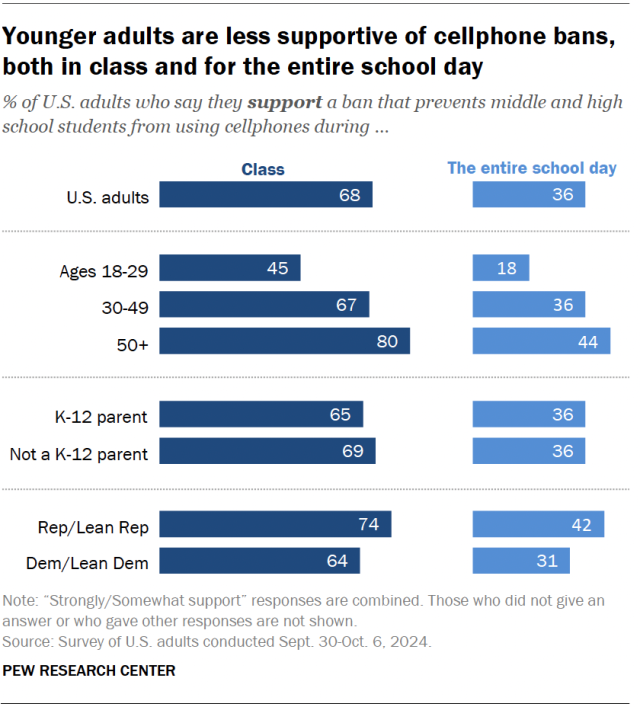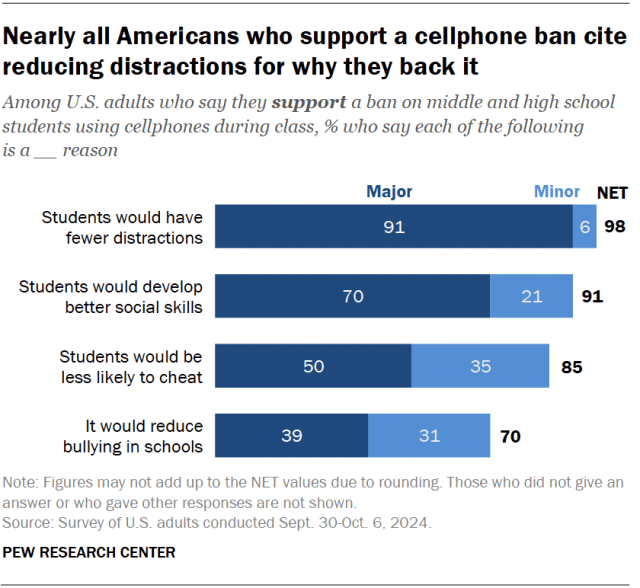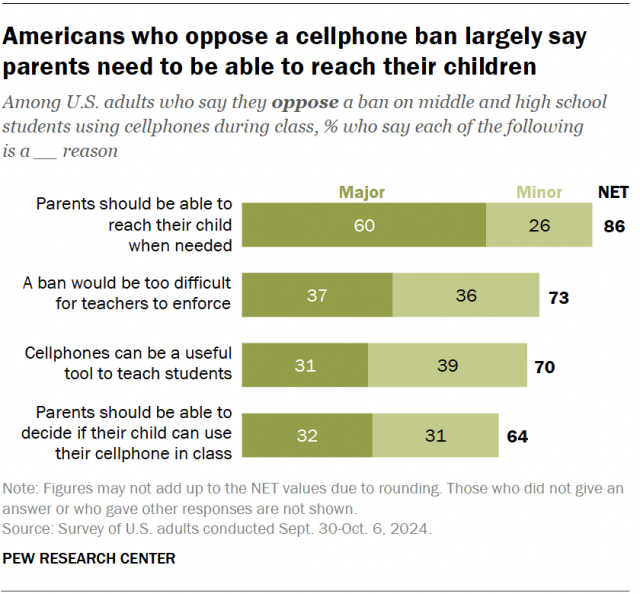As lawmakers and educators crack down on cellphone use in schools, most Americans back bans on using phones in classrooms but are less supportive of full-day restrictions.

Overall, 68% of U.S. adults say they support a ban on middle and high school students using cellphones during class, according to a Pew Research Center survey conducted Sept. 30-Oct. 6, 2024. This includes 45% who strongly support this.
Another 24% oppose this, while 8% say they aren’t sure.
Pew Research Center conducted this study to understand Americans’ views of cellphone bans for middle and high school students.
For this analysis, we surveyed 5,110 adults from Sept. 30 to Oct. 6, 2024. Everyone who took part in this survey is a member of the Center’s American Trends Panel (ATP), a group of people recruited through national, random sampling of residential addresses who have agreed to take surveys regularly. This kind of recruitment gives nearly all U.S. adults a chance of selection. Surveys were conducted either online or by telephone with a live interviewer. The survey is weighted to be representative of the U.S. adult population by gender, race, ethnicity, partisan affiliation, education and other factors. Read more about the ATP’s methodology.
Here are the questions used for this analysis, the topline and the survey methodology.
Some school districts have called for banning cellphone use entirely, not just during class. Our survey finds the public is far less supportive of a full-day ban on cellphone use than a classroom ban.
About one-third (36%) support banning middle and high school students from using cellphones during the entire school day, including at lunch as well as during and between classes. By comparison, 53% oppose this more restrictive approach.
Jump to read more about why Americans support or oppose classroom cellphone bans.
Views by age
Young adults are less likely than older age groups to support a cellphone ban in middle or high school, either during class or the entire school day.

Less than half of adults under 30 (45%) say they support banning students from using cellphones during class. This share rises to 67% among those ages 30 to 49 and 80% among those ages 50 and older.
There are similar age differences in views about daylong cellphone bans. Only 18% of adults under 30 support preventing students from using cellphones throughout the school day. By comparison, 36% of those ages 30 to 49 and 44% of those 50 and older favor this type of ban.
Views by whether someone is a K-12 parent
While some media headlines focus on parents’ resistance to cellphone bans, our survey shows few differences in views between those who have school-age children and those who don’t.
For example, 65% of parents with a K-12 child support banning students from using their cellphone during class. This compares with 69% of those without children in these grades. And identical shares (36% each) support a ban for the entire school day.
Views by party
Majorities of Republicans and Democrats – including independents who lean toward either party – favor banning students from using cellphones during class. Still, support is somewhat higher among Republicans than Democrats (74% vs. 64%).
A similar pattern exists for views on bans that span the entire school day. While 42% of Republicans back full-day restrictions, 31% of Democrats do.
Why Americans support cellphone bans during class
We also asked people about possible reasons they support or oppose a cellphone ban.

Among those who support a ban during class, nearly all (98%) say a reason they back it is because students would have fewer distractions in class. This includes a whopping 91% who say it’s a major reason. Previous Center findings show that most U.S. high school teachers say cellphone distractions are a major problem in their class.
Majorities of supporters also point to each of the other reasons we asked about. But fewer describe each as a major reason. Among those who support a ban:
- 70% say a major reason is students would develop better social skills.
- 50% say a major reason is students would be less likely to cheat.
- 39% say a major reason is it would reduce bullying in schools.
There are only modest differences by age and political party in the shares of people who cite each of these as major reasons.
Views by whether someone is a K-12 parent
The only reason where parents of K-12 students differ from those who are not K-12 parents is bullying. Among cellphone ban supporters, 44% of K-12 parents say a major reason they favor it is that it would reduce bullying in schools, compared with 37% of those who are not K-12 parents.
Why Americans oppose cellphone bans during class

Of those who oppose a ban, majorities cite each of the four reasons we asked about. Six-in-ten – the highest share for any reason we asked about – say a major reason they oppose a ban is because parents should be able to reach their child when needed. Another 26% say this is a minor reason they oppose cellphone bans during class.
Looking at the three other reasons we asked about:
- 37% say a major reason is that it would be too difficult for teachers to enforce.
- 32% say a major reason is parents should decide if their child can use their cellphone in class.
- 31% say a major reason is that cellphones can be a useful tool for teaching.
Views by whether someone is a K-12 parent
Parents of K-12 students are especially likely to stress a parent’s ability to reach their child. Among opponents of a ban, most K-12 parents (70%) say this is a major reason. This share drops to 57% among those who are not K-12 parents.
K-12 parents are also more likely than their peers to say that a major reason they oppose a cellphone ban is that parents should be the ones who decide (41% vs. 30%).
Views by age
Among those who oppose a ban, older Americans are less likely than younger adults to cite three of the reasons we asked about:
- 45% of those ages 50 and older say a major reason is that parents should be able to reach their child. That compares with 68% of 18- to 29-year-olds and 63% of 30- to 49-year-olds.
- 26% of those ages 50 and older say a major reason is that parents should decide, compared with 35% each among those under 30 and those ages 30 to 49.
- 24% of those ages 50 and older say a major reason is that cellphones can be a useful teaching tool, compared with 35% of those ages 18 to 29 and 34% of those ages 30 to 49.
Views by party
Democrats are more likely than Republicans to point to parents being able to reach their child as a major reason for opposing a ban. Among opponents of a ban, 65% of Democrats say this, compared with 52% of Republicans. Democrats are also more likely to cite cellphones being a useful teaching tool as a major reason (35% vs. 27%).
Note: Here are the questions used for this analysis, the topline and the survey methodology.




